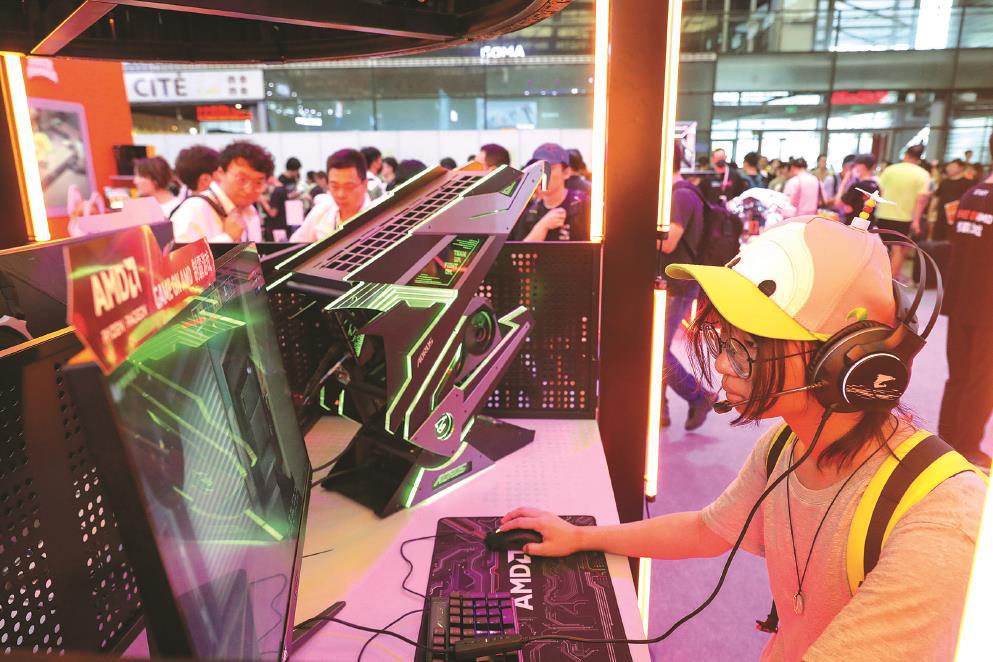Will AI Completely Disrupt the Gaming Industry in the Future?
-
Yesterday, the 20th China Digital Entertainment Expo & Conference (ChinaJoy) concluded at the Shanghai New International Expo Center. This year's event was grand in scale, spanning 11 exhibition halls with an exhibition area exceeding 120,000 square meters, attracting a total of 338,000 visitors.

Players experienced the profound impact of technological advancements at the 20th ChinaJoy. Photo by Ye Chenliang.
This is not only a global gathering for gamers but also a mirror reflecting the latest trends in the gaming industry. With global attention on cutting-edge technologies like ChatGPT, artificial intelligence (AI) became the brightest 'star' in the digital technology innovation exhibition area at this year's event. CMGE's Sword and Fairy World incorporated AI technology to provide players with an immersive 'everything is interactive' experience; 'Xingzhe AI' helped game graphic designers significantly improve efficiency through 2-minute doodle creation and 10-minute image-to-image iteration... According to Sun Shoushan, Chairman of the China Audio-Video and Digital Publishing Association, over 60% of Chinese gaming companies have adopted AI technology. New technologies are driving the transformation of the gaming industry in an undeniable way.
Although ChinaJoy has ended, the discussions it sparked continue: Will AI completely disrupt the gaming industry in the future?
Technology Empowerment: Productivity Improvements of Up to 90%
Undoubtedly, gaming is an industry driven by technological innovation. At this year's ChinaJoy, leading companies showcased their new AI initiatives. Tencent's Honor of Kings collaborated with its AI lab team to deepen research on multi-agent博弈, exploring the potential of new technologies across industry scenarios through the 'Enlightenment' research platform. NetEase established multiple research institutes and labs dedicated to developing various AI technologies and integrating them into the entire game industrialization process. Perfect World applied AI technology to multiple stages of its R&D pipeline and independently developed virtual digital humans.
The most immediate change brought by AI applications to the gaming industry is a significant improvement in production efficiency. According to Wang Yi, Senior Vice President of NetEase, AI has improved工作效率 by up to 90% in key production areas such as voice generation, concept art generation, video motion capture, and model generation. 'Previously, one of our projects had less than 10% progress in a year, but after using these AI tools, over 50% of the progress was completed in two months.' In the view of Lu Xiaoyin, Co-CEO and President of Perfect World, AIGC (Generative AI) has enhanced productivity in game design, audio, art, and programming,压缩了游戏整体项目的研发周期 and significantly reduced production costs, representing a disruptive change for the industry. Xu Zhigao, General Manager of 37 Interactive Entertainment, noted that using AI to create game character concept art can reduce the time to one-third of the original, while AI-powered motion capture and video-to-3D动作 conversion take less than 20 seconds. Xian Handi, Co-Founder of CMGE, stated that the company plans to reduce外包成本 by 50%-60% and personnel costs by 10%-20% by the end of this year using AI.
Additionally, AI technology helps deliver better and more diverse user experiences. For example, AI can bring NPCs (non-player characters) to life by training their expressions, voices, and dialogues, enabling them to主动 interact with players like real humans in different emotional and environmental states. Zhang Xiangzheng, President of 360 Zhinao, believes AIGC can redefine the concept of 'digital humans' and unlock new demand. 'With personalized and customized knowledge bases, digital information will align better with设定的,而不是用大模型本身去‘胡说八道’。Digital humans with personas, memories, and souls will have highly diverse application scenarios.' It is estimated that the gaming industry's contribution to the AI sector will grow from 31.576 billion yuan in 2023 to 103.81 billion yuan by 2030, with an average annual growth rate of about 16%.
AI as a 'Co-Pilot for Creation,' Lacking Disruptive Creative Capabilities
As the application of new technologies in gaming continues to expand, many game creators and developers share a common concern: 'Will we be replaced by AI?'
Zhang Junbo, President of Unity China, holds an optimistic view on this matter. He believes that relatively procedural roles such as concept artists, game designers, and 3D modelers may be replaced, but AI cannot contribute creatively—it requires human instructions to function. "AI is only responsible for solving problems, not for posing them," he noted. He cautioned that using AI for generation and production could lead to similarities in game design and homogenization of assets, so game developers need to invest more resources and attention into gameplay innovation.
In fact, when it comes to artificial intelligence, many in the industry are still in the phase of "bold assumptions, careful verification." "At present, AI does not possess the disruptive capability to overtake humans in content creation," said Guan Song, co-founder of DreamSky. He believes game companies should more pragmatically treat AI as a production tool. Tao Ran, General Manager of Microsoft Greater China's Azure Division, stated that game development is a human-led creative endeavor, with advanced technology serving as an AI "co-pilot" to assist humans, but it will never replace humans in game development and creation. "Humans have always been, and will always be, in the lead."
It is widely recognized in the industry that AI technology will further alleviate labor-intensive tasks, allowing practitioners to focus on creativity. Currently, the industry is in a state of coupling between AI and human labor, which may give rise to new job opportunities. For example, NetEase Fuxi's human-machine collaboration platform, "Youling," provides work such as game dungeon creation, intelligent NPCs, and AI-generated character customization for retirees, people with disabilities, and others. In 2024, the platform is expected to create 100,000 jobs for society. "The gaming industry has reached a critical transformation period where technology safeguards the foundation, talent drives growth, and scenarios span across countless fields," predicted Wang Yi. With the support of AI technology, ordinary people can also join the ranks of digital content creation, becoming a new generation of forces reshaping the gaming industry.
